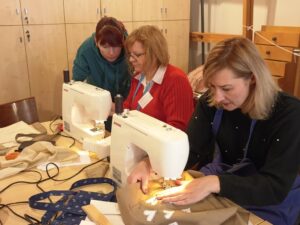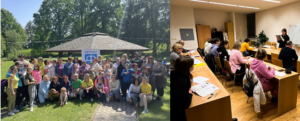Since the beginning of the invasion more than two years ago, the team of the Evangelical Diakonia has been providing vital support to Ukrainian refugees with temporary protection status in Slovakia, paving the way for the effective exercise of their rights and solutions across communities.
Initial aid efforts have evolved into comprehensive integration activities, targeting support for mothers, children, seniors, and people with disabilities. Key ongoing initiatives include regular psychosocial support programs, employment assistance, therapeutic groups, language classes, and tutoring for children and youth. Supported by the World Lutheran Federation, the Diakonia now coordinates educational and creative therapeutic activities in seven Slovak communities, helping single-parent Ukrainian families adjust to their new lives. Weekly educational and creative sessions help refugee children reduce stress and bridge educational gaps.
Initial Humanitarian Efforts
Starting with humanitarian and food aid in the early months of the war in 2022, the support focused on addressing basic living needs. Over 500 refugees were accommodated in church housing facilities, and homes were renovated to host an additional 100 refugees in approximately ten church congregations. The accommodations were equipped with dishes for communal kitchens and educational supplies for children and adults, helping them to stay in touch with relatives in Ukraine and receive regular updates on adaptation measures. The team regularly distributes cash vouchers, essential materials, and food, supported by retail stores, food banks, and generous donations from the faithful, amounting to more than €120,000 since 2022.
Building Trust Through Local Engagement
Consultations with local stakeholders and refugees are key to the team’s success. Therefore, one the one hand, the team collaborates with spiritual leaders, local organizations, employers, career development agencies, teachers, schools, libraries, labour offices, and social care services. This cooperation enables the use of various mechanisms to support refugee integration into the local labour market, including through volunteering opportunities, activation programs, and mentoring support in both private and public organizations.
On the other hand, active engagement with refugee communities has allowed for a better understanding of their everyday needs, preventing additional stress from unfamiliar surroundings. The team ensures each community is visited at least once a month, maintaining contact with the community leader, collaborating with the local pastor, and discussing specific issues with refugees. The needs of people with temporary protection evolve monthly, and the goal is to stabilize the families and alleviate trauma. To achieve this, a program of regular activities for mothers, fathers, grandparents, children, and teenagers has been established across the communities.
Holistic Health and Mental Health Support
More than 2,300 refugees from war-torn Ukraine have participated in the support program, which includes over 20 regular weekly activities run by the Evangelical Diakonia in Slovakia, with financial support from Deutsche Katastrophenhilfe and collections by the Evangelical Church of the Augsburg Confession in Slovakia. The program recently expanded to include education for children and youth, funded by the World Lutheran Federation. The team works with traumatized refugees and those in need, alongside church congregations. Over 15 refugees and 20 local experts in education, psychosocial support, and language skills are employed and trained in safe accompaniment and communication to meet the changing needs of communities in more than 20 church congregations and communities. Furthermore, over 100 refugees received various forms of health-related assistance, including personal assistance in hospitals, medical equipment, and covering the costs of vital tests and treatments.
Language, Educational and Vocational Training
As part of its comprehensive support program, the Evangelical Diakonia in Slovakia connects communities through an array of educational and vocational initiatives. Across seven different communities, over 300 refugee adults and children actively participate in Slovak language courses, which are complemented by English and French courses.

Emphasis is placed on career development and vocational skills acquisition. Assistance has been provided to women in obtaining certificates for specific professional activities in the Slovak market. Moreover, tailored activities and individual consultations are available in five cities. Notably, in Ružomberok and Banská Bystrica, two groups of 15 individuals have acquired sewing skills, crafting bags and supplies for schoolchildren and mothers. These items were also later embellished by refugee women as a part of art therapy sessions. This holistic approach not only supports income-generating activities but also promotes artistic expression and community collaboration.
Enhancing Community Integration and Support for Refugees
Drawing from the local community as a “new” family, progress is made in group therapy, including art, sports, breathing, psychosocial support, and other activities. To minimize loneliness and isolation, the Evangelical Diakonia organizes targeted meetings focused on advocacy, such as legal assistance, and community activities, creating networks with refugee communities and connecting them with local people. More than 40 community meetings have been dedicated to learning about others and opening up to new environments.
Efforts are made to address any problem and advocate for the rights of those exposed to abusive or disadvantageous practices at work or in any public institution. The aim is for no one to be left behind, providing individual consultations with psychologists and local social service experts. Educational and work agencies are also informed about the importance of building good relationships and trust with refugees. When communicating with government agencies, refugees should feel comfortable and safe. With better access to institutions, education, skill training, and earning a livelihood, refugees can stabilize their families in Slovakia, join local communities, engage in regular church activities, and be part of the broader community and society.
For the full original article, see here.




